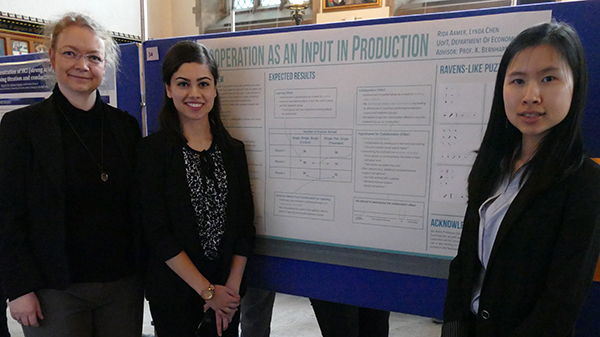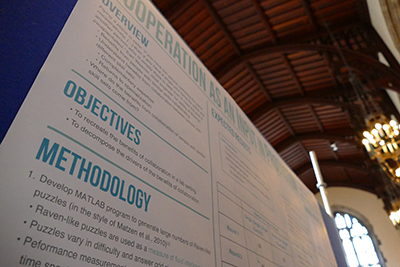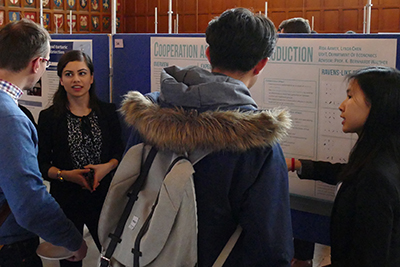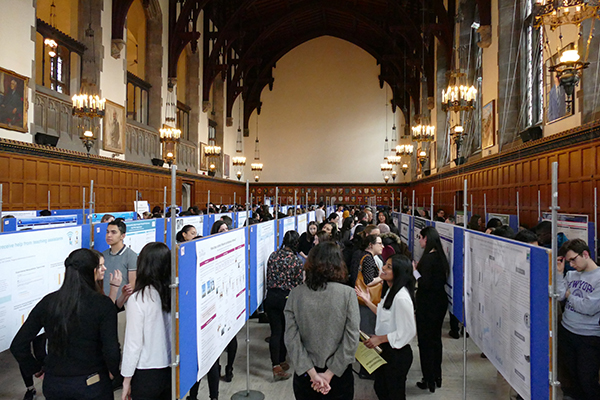News
STUDENT FOCUS: RESEARCH OPPORTUNITY PROGRAM
Undergraduates Rida Aamer and Lynda Chen on the experience of assisting in faculty member Karen Bernhardt-Walther's research
March 20, 2018
The Research Opportunity Program and the Undergraduate Research Forum
Last week saw the Faculty of Arts & Science Undergraduate Research Forum take place in Hart House's Great Hall, with over 100 poster presentations from a wide range of disciplines, with the undergraduate researchers involved on hand to discuss their findings. The 299Y/399Y Research Opportunity Program (ROP) brings students and faculty together in the development of the faculty member's research in an interactive student-teacher partnership.
The ROP Experience in Economics
Since last fall Rida Aamer (Economics and Statistics double major) and Lynda Chen (Finance and Economics specialist) have been working with Professor Karen Bernhardt-Walther, whose multi-year study aims to better understand how people cooperate to solve tasks.

At the Undergraduate Research Forum. L-R: Professor Karen Bernhardt-Walther; Rida Aamer; Lynda Chen
"A large study like this takes a team. The progress made this year would not have been possible without the efforts and hard work of Rida and Lynda," said Bernhardt-Walther. Following their stint at the research forum, we caught up with the students to hear their perspectives on the challenges and benefits of participation in the ROP.
What did you get most out of the program?
- I had already been considering grad school and the ROP gave me a first-hand introduction to what it means to be a researcher. Also, the chance to actively work with a faculty member one-on-one was very valuable. —Rida Aamer
- It provided me with a different learning environment that stimulated new ideas and insights continuously. It also helped me understand the difficulties of research and the process that must be considered when results are interpreted. —Lynda Chen
What qualities should a student have to benefit from the program?
- It's different from most other courses in that it doesn't have the external motivation that comes with a strict syllabus, or a reading list, or due dates with late penalties. Students have to be self-motivated with a keen interest in learning,
and be passionate about the topic they are investigating. —Rida Aamer
- Students should be driven by a desire to explore and learn; it requires a strong level of involvement. The answer is not lying directly ahead of you; it is unlike problems presented in lectures and exams where there is an objective answer. You are the one finding the results, analyzing the data, and drawing the conclusions. —Lynda Chen
What were the challenges at the research forum of explaining your work to someone unfamiliar with the subject/methodology?
- The experiment attempts to answer an economics question using a methodology heavily inspired by psychology research, so our main challenge was explaining why/how our methodology can be used to measure economic outcomes. We found that explaining our work to those with no background in the subject actually improved our own understanding of our project. —Rida Aamer
- Explaining work and findings to those outside the field is something most researchers face. Since we are very familiar with the objective and methodology of the research, we needed to be aware of the tendency to introduce vocabulary specific to the subject without thinking about what these terms mean to others not involved with the study. —Lynda Chen
What did you learn from other exhibitors at the forum?
- My biggest takeaway in visiting other student researchers' posters was the importance of the "so what"
question when presenting research. When speaking to students from the life sciences, for example, my main question was usually 'Why does this research matter?'
The researchers that stood out were the ones best able to explain the relevance and applications of their work. —Rida Aamer
- The forum not only provided the opportunity to meet other student researchers but also to gain an insight into the way others deliver and communicate their results. Looking at various poster presentations helped me understand some of the more effective ways of presenting information. The layout and order of information is extremely important.
Visual representations, labelled diagrams and descriptive tables made material much easier to understand. —Lynda Chen


About the Research Project
The objective of the study is to better understand the ways in which people cooperate in solving tasks. "The tasks are easily understood," explained Professor Bernhardt-Walther. "They do not require prior knowledge or experience, and may be simple or difficult to solve. We use Ravens-like matrices, because they are a well-established, non-verbal measure of fluid intelligence." In this past year, the team has developed its own database of Ravens-like puzzles, which are being normalized using Amazon MTurk. Next comes the stage one study, with subjects randomly assigned to solve puzzles individually or in pairs; in stage two, subjects will complete puzzles in three rounds, which will allow observation of within-subject effects.
Bernhardt-Walther enumerated some of the methods employed in the experiment's approach. "We measure performance both in terms of number of tasks solved correctly and in the time taken to completion. We determine the benefit of collaboration by comparing the performance of individual subjects with the performance when two subjects work together." In addition, the subjects' communication with each other is recorded, as is eye movement, using an eye tracker. "Analyzing this data," she explained, "we can describe the subjects' behaviour and characterize the nature of their collaboration. Varying the task then allows us to describe the value that different forms of collaboration contribute in different settings."

Faculty of Arts & Science Undergraduate Research Forum,
Great Hall, Hart House, March 14, 2018



